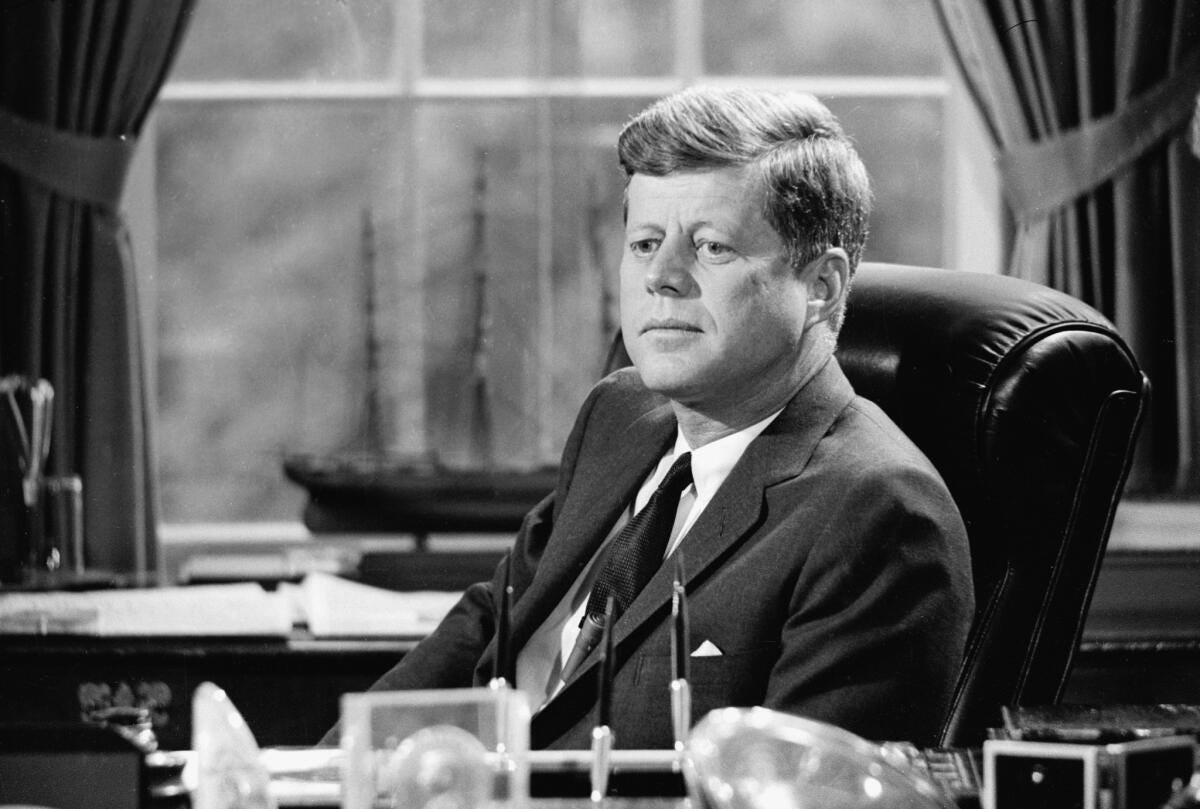Remembering JFK
His leftist admirers would do well to learn from the real JFK, not the made-up one of their fertile imaginations.
by Rod D. Martin
December 4, 2003
America marked the 40th anniversary of John F. Kennedy's assassination last week, and much verbiage was spent in proclaiming him the hero of the party today epitomized by his youngest brother Teddy. Yet the memory of Kennedy resonates with virtually all Americans -- not merely those on the left -- and with reason; indeed, reasons his brother’s acolytes would rather forget.
JFK was no conservative, yet he was hardly the poster boy for today's left. In two key areas -- totalitarianism and tax cuts -- JFK wasn't even a liberal by the standards of his time, let alone ours.
Scholars call Kennedy a Cold Warrior. They're right. JFK saw Communism as he did Nazism, as a totalitarian monstrosity threatening life and liberty everywhere. Rejecting accommodation as appeasement, he embraced the containment doctrine that guided America after World War II.
Like Kennedy, most liberals of that era rejected appeasement. Yet Kennedy went further, striking right at the jugular of the Roosevelt and Truman administrations. Having criticized FDR's people for handing Eastern Europe to Stalin at Yalta in 1945, he joined Republicans in blasting the Truman administration and the State Department for their culpability in China's collapse before the Communists four years later. Speaking from the House floor, he said, "The responsibility for [this] failure...rests squarely with the White House and the Department of State."
Kennedy also confronted communist subversion at home. As a House labor committee member, he helped convict a communist union official. While in the Senate, he backed Senator Joseph McCarthy's investigations. In January 1955, after McCarthy had fallen from power, JFK walked out on a banquet speech by McCarthy-hating journalist Edward R. Murrow. Three years later, at a Harvard dinner, when a speaker compared McCarthy with convicted Soviet spy Alger Hiss, JFK exclaimed, "How dare you couple the name of a great American patriot with that of a traitor!," and stormed out of the building.
Eventually, Kennedy came properly to lament McCarthy's methods. Yet unlike most of his liberal Democratic contemporaries, JFK refused to deny the obvious: the high-level Communist penetration of FDR's State Department in the 1930s and 1940s. For this courage he almost paid dearly. In 1960, Eleanor Roosevelt tried mightily to deny him the Democratic presidential nomination, and New York's Liberal Party almost withheld its endorsement of him as well.
As with totalitarianism, so, too, with tax cuts. Midway through his presidential term, JFK proposed a sweeping across-the-board tax cut, dismaying liberal Democrats, who preferred wasteful spending binges to "stimulate" the economy.
Today's liberal historians equate JFK's tax cut proposals with a demand-side stimulus, but that's not what JFK said while arguing for them. Here's what he said: "The present rates ranging up to 91% not only check consumption but discourage investment and encourage...the avoidance of taxes [rather] than the production of goods." He went on: "Our present tax system...reduces the financial incentives for personal effort, investment, and risk-taking."
This was supply-side economics, pure and simple. Here was a Democratic president advocating a pre-New Deal, conservative Republican direction on taxes. And here were proposals that fit the rhetoric: a massive across-the-board cut, coupled with a 26-percentage-point reduction of the highest rate from 91% all the way to 65%.
Needless to say, liberal Democrats reacted to this about as cordially as they had to JFK's courage in standing against them on totalitarian communism years before. Thus, forty years ago last week, at the time of his assassination, the tax-cut bill was stuck in Congress. It took LBJ to get it through Congress the following year, an homage to the slain young President.
Now it must be said, when it came to communism, JFK as president did not exactly practice what he had preached while in Congress. For example, Kennedy convinced the Russians to withdraw (not-yet-armed-or-operational) missiles from Cuba, but only by agreeing to remove our (fully-operational) missiles from Turkey. And surely he had more than his share of other flaws, some all-too-reminiscent of the later President he once inspired at Boys Nation.
Yet on both totalitarianism and taxes, time has been kind to Kennedy -- and cruel to the left. Following Soviet Communism's fall in 1991, out came the KGB files and the rest is history. The old allegations were true: a half century ago, at high levels, Communists had indeed infiltrated the State Department, and other institutions as well. And as for tax cuts, the JFK cuts did what they were supposed to do and more. Productivity soared, revenues doubled, and prosperity returned, foreshadowing the more dramatic Reagan cuts to come. And as for today, President Bush’s tax policy’s impact on the post-9/11 economy becomes more apparent by the day.
John F. Kennedy’s standing as a president continues to be debated; but even so, one thing is clear: on tyranny and taxes, JFK was no liberal. His leftist admirers would do well to learn from the real JFK, not the made-up one of their fertile imaginations.
— This essay was originally published at The American Spectator.



